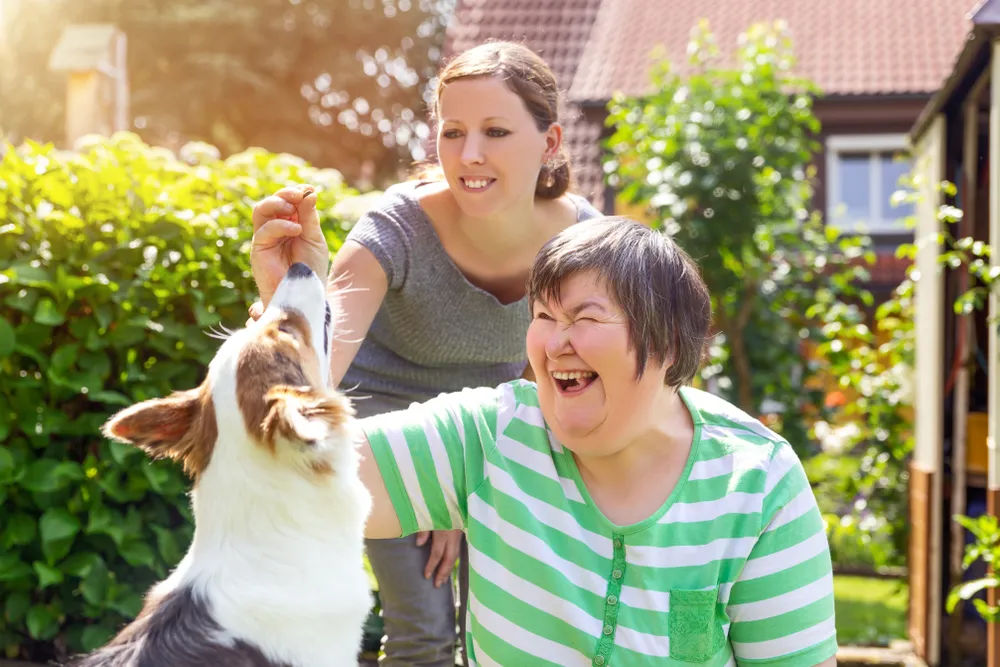Animal-assisted therapy (AAT), also referred to as pet therapy, is a type of therapy that involves animals as a part of the therapeutic process to improve physical, emotional, social, and cognitive functioning. Pet therapy is rooted in the Biophilia Hypothesis, which is the “idea that humans possess an innate tendency to seek connections with nature and other forms of life.”
A professor at Western Carolina University, Psychologist Harold Herzog, is an expert in the human-animal connection, and has spent over three decades investigating the complex psychology of human interactions with other species, and established a direct connection between interacting with animals and enjoying positive health benefits. Animal-assisted therapy provides children with:
- Emotional support: Animals provide a sense of comfort, acceptance, and unconditional love, which can be particularly helpful for children who struggle with emotional dysregulation and/ or have experienced trauma.
- Reduced isolation: Empirical evidence suggests that AAT can help reduce feelings of isolation and loneliness, as children who feel disconnected from others find comfort and companionship in working with animals.
- Boosted immunity: The release of oxytocin that occurs when engaging with an animal impacts the immune system and increases the pain threshold, helping young people heal more quickly. The results of one study found an increase in salivatory immunoglobulin A, which indicates a healthy immune system function, after young people spend time petting a dog for less than 20 minutes.
- Positive social skills: As stated in Human–animal interaction and the benefits to mental health: A phenomenological study, “Animal interaction can act as the vehicle through which social connection may be enhanced or increased.” One study reviewing animal-assisted therapy in psychiatric rehabilitation found that pet therapy “lead to a significant increase in interactions with other patients over the course of 4 weeks in comparison to rehabilitation without animals. This included smiles, sociability, helpfulness toward others, activation, and responsiveness.”
- Increased motivation: Research shows that children are often more motivated to engage in therapy when animals are involved. The presence of an animal can make therapy sessions feel more enjoyable and engaging, which can improve treatment outcome.
Further Information and Support
For most of us, life can be very stressful, leading us to feel emotionally charged, which can cause anxiety, panic attacks, depression, and getting stuck in a cycle of being burdened with negative thoughts. Navigating through the challenges and emotional turmoil of life can be overwhelming, but you do not have to go through it alone. Engage Treatment is a Joint Commission Accredited professional psychological practice. We specialize in treating children, teens, and young adults struggling with depression and anxiety through community-focused treatment plans that incorporate a carefully selected combination of therapeutic interventions.
Our compassionate, multidisciplinary practitioners are devoted to providing the highest quality of care that helps ignite positive change and enables clients to reach optimal health and well-being. Please do not hesitate to reach out for guidance.
We are happy to answer questions and provide you with any additional information. Feel free to call us at 805-497-0605 or email us at [email protected]. You are also welcomed to get in touch by filling out our contact form. We look forward to connecting and having the opportunity to discuss how we might best be able to support you.
Contact Us
Westlake Campus:
IOP Program
2625 Townsgate Road, Suite 210
Westlake Village, California 91361
Agoura Campus:
Private Therapy & Parenting Program
30300 Agoura Road, Suite 250
Agoura Hills, CA 91301
805-497-0605
805-371-4862











© 2023 Engage Treatment Program, Inc. All Rights Reserved.
LGBTQ Friendly
About
• About Engage
• Our Team
• Career Opportunities
• Individual / Family Therapy
Resources
• Community Resources
• Blog
• FAQ
• Referring Clinicians
• Privacy Policy & SMS Terms






